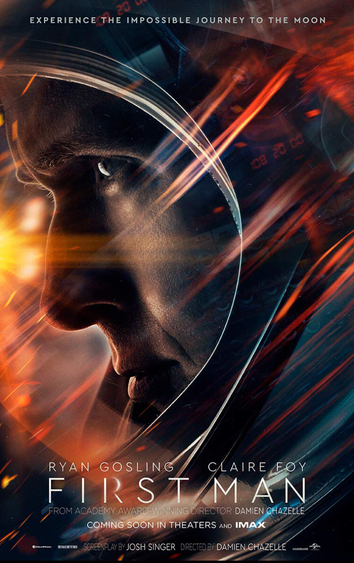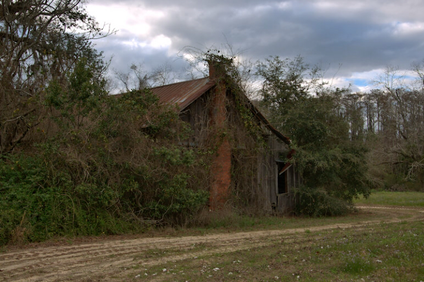|
Sam Burnham, Curator @C_SamBurnham  I typically like my drama to be in the movie rather than about the movie. So I’ve been curious about First Man. With so many complaints about the depiction of the flag planting, the portrayal (or lack) of Neil Armstrong’s patriotism, and whatever else has been stirring, I really wanted to see this one. From a stylistic standpoint, this is a well made film. The use of camera effects and angles, music, perspective, all contribute to the storytelling. Building drama in this story is hard because (spoiler alert) Apollo 11 was successful. Making a well-known success still be suspenseful is hard. But this film does that. One of the greatest triumphs in human history has you on the edge of your seat, even 50 years later. As hindsight is 20/20, it is easy for us to think the moon shot was an simple task. In our mind, there was no chance that Michael Collins would have to return to Earth alone, leaving his two teammates to remain forever at rest on the lunar surface. There is no thought of something going wrong somewhere along the half a million miles the mission covered from the Earth to the moon and back. It could have easily gone very differently. This film shakes your assurances and awakens you to the truth that Apollo 11 was a frighteningly dangerous mission. In doing so it gives a picture of the courage and adventurous spirit that was required to pull it off. While there has been much talk about the flag, it’s there. You plainly see if standing proud alongside The Eagle at Tranquility Base. There is no scene depicting Armstrong and Aldrin planting it but that is not something I missed in the story. I didn’t walk away thinking that the story suffered from that omission. On the contrary, this story is not about the flag, it’s really only about the moon because walking on the moon is what Armstrong is famous for. He is the subject of the movie. And the story gave me an appreciation for him as a person. Seeing the man struggle with so much while pressing forward into iconic status in the pantheon of American history. Armstrong is a pragmatic engineer with a stoic outward appearance but a deeply emotional core. Viewers are privy to his inner thoughts and emotions while those who love him most are often left curious. But the Armstrong we get to know in First Man is the hero America needs. He’s not arrogant or selfish. He’s confident without bragging and courageous without carelessness. He’s quiet and reflective yet competent and inspiring. Ryan Gosling sold me Neil Armstrong. I bought it. With a larger than life character, that’s no easy task. But he does well with it and helps you emotionally connect with an American legend. Claire Foy, who was so convincing as Queen Elizabeth in The Crown, never gives a hint of the Queen’s English. Her passionate portrayal should get her some buzz come awards season. Jason Clarke, who I loved in Mudbound, is excellent in his supporting role as Ed White. You can’t make a NASA movie without Deke Slayton and Kyle Chandler is quite convincing in that role. At the risk of being repetitive, the key to appreciating First Man is to read the title again. It’s not about America. It’s not about the moon, the moon landing, or the space program. It’s about Neil Armstrong. It accomplishes that task thoroughly. If you go in expecting that, you can’t be disappointed.
0 Comments
Sam Burnham, Curator @C_SamBurnham  Abandoned Farmhouse Near Pebble City, Mitchell County - Photo Courtesy Brian Brown, Vanishing South Georgia Abandoned Farmhouse Near Pebble City, Mitchell County - Photo Courtesy Brian Brown, Vanishing South Georgia i read a recent article in the New York Times.Times writer Glenn Thrush was in Camilla interviewing farmers who lost so much, some everything they had, in the storm. His article didn’t focus on the losses, the recovery efforts, or the work of farmers. No, he chose to focus on climate change. I’ve done several rebuttals to the arrogant work of East Coast elite “journalists” over the years. This time I’m not wanting to just vent off my frustrations with an angry reply because I think there’s too much at stake this time. This time it’s not just a typical New Yorker looking down his nose at the “dumb Southerners” who don’t understand science. As the political and social divide continues to grow in America and we inch ever closer to whatever cataclysm awaits us at the end of this bumpy road, somewhere the chorus of a Greek tragedy is crying out “this is how they got Trump.” At some point there has to be a realization. I’m sitting in Georgia, an advocate for the defense in this case. So my position is admittedly biased. But I’m also a writer and I know a bit about that craft as well. Let me just say that a person who can take a woody shard of genetic material, shove it in a hole in the ground, and allow the sky to provide the needed hydration and photosynthetic energy and thereby derive a living for himself and his family is either a scientist or a witch doctor. Either way, his livelihood requires much more understanding of science than a newspaper writer needs. And that is where the realization must happen. Mr Thrush May have spent the decade of tropical silence between Katrina/Rita and Harvey attending cocktail parties but the farmers in South Georgia were busy trying to turn seeds, dirt, rain, and sunlight into money. While Thrush was rubbing elbows with celebrities, the farmers were looking at late frost dates, finding days that were dry enough for planting, planning crop rotations, timing fertilizers or defoliants, setting traps for boll weevils, planning irrigation, paying property taxes, researching breeds of hogs to determine which will be most profitable. You know, science stuff. But the biggest realization that needs to be made is that what happened in South Georgia when that storm ripped through wasn’t political. It wasn’t about climate change. It wasn’t even about the $2.5 billion in agricultural losses. What happened was bigger than all that. It was a human tragedy on a colossal scale. Farming is a ridiculously difficult job. Yes, there are some factory farms raking in subsidies and turning massive profits. But there are far more that are covering expenses and maybe a little more. Many of these farmers are working the land their parents, grandparents, and perhaps further generations worked before them. Many hope to pass down the land and the livelihood to their children. Recovering from this disaster is the only way such a cultural and familial heritage can be passed on because there is presently nothing to hand down to the next generation. I'm sure part of the article's bourgeois tone was Thrush's own frustration. He was the NYT's White House correspondent until several of his female coworkers brought allegations of unwanted sexual behavior against him. I'm sure he'd rather be reporting on policy in Washington than covering the ruination of some backwards hayseeds in Mitchell County. So instead of covering the human tragedy, he made it all about politics. It says a lot that his employers think covering a human tragedy in South Georgia is a demotion worthy of sexual harassment. Why are these people the ones reporting this story in this way and telling the world it is All the News That's Fit to Print? How is this worthy of a newspaper of record? How can we ever expect to change the tone of this conversation when human tragedy isn't fit to print but the writer's ideas about the role of climate change in the tragedy is? As it is becoming increasingly clear that big city journalism is trending toward caring less and less about what goes on in places like Nashville or Alapaha, Georgia, Southerners need to be trending more toward small journalism to tell the stories about what is really going on. Support your local papers and other journalism. We need better regional options as well. Maybe if the New York Times wants to cover a story like the hurricane and agriculture they should partner with the Valdosta Daily Times rather than send a Washington-based Times writer who doesn't understand farming or rural life. Mostly, we need thoughtful reactions. We need to be more and more self-sufficient, more and more regionalist and localist in how we operate. Perhaps instead of giving an out-of-town big city writer a chance to try to make us look stupid in the Times, we need to throw him off the property as soon as he shows up. To their credit, the New York Times did open comments to farmers and others in the area to add input through a comments section on a follow up to the original article. But what did that prove other than admitting, after the backlash, that sending Thrush to Georgia was also a disaster? So I offered the Times my advice on the matter in the form of a comment I'll add here: My name is Sam Burnham, I’m the Curator of All the Biscuits in Georgia (allthebiscuitsingeorgia.com) and an advocate and supporter of agriculture and the people who make it happen. Rather than sitting in Manhattan waiting for responses, you need to send people down here to look and see. They need to know some farmers and the local businesses who depend on the success of an agricultural economy. Get off the paved road, get your hands dirty, be real journalists. More importantly, be a real humans. You want to understand why what you printed was so wrong? Come see for yourself. Come open minded and ready to learn. Oh, and come hungry.  Stay On Your Side Stay On Your Side I was in college before I found a rivalry that equaled this one in intensity. The Lord be praised that I have no family to have fallen on the misfortune of enrolling at troy state. That takes a bit of the personal touch out of that rivalry. When it comes to the World's Largest Outdoor Cocktail Party, I was never so fortunate as a child. I grew up in a Georgia Bulldog home. Vince Dooley, Erk Russell, The Weaver Brothers, and Herschel Walker were folk heroes on a par with Pecos Bill or Johnny Appleseed. Larry Munson's call of the Belue-Scott miracle in 1980 was equal to an Arthurian legend and the broken steel chair was Excalibur. The twist is that my grandparents lived less than 30 minutes from Gainesville. No, not that Gainesville. THAT Gainesville. We had to use a Gainesville exit to get off the interstate when we went to visit. "University of Florida NEXT RIGHT" My mother was blessed with seven brothers. At publication time, I was still waiting on the US Census Bureau to contact me about my request about how many cousins I have on that side of the family. With the rare FSU exception, every last one of them is a rabid fan of the Fightin' Gators. My uncle Mike, arguably the most rabid of the bunch, lived here in town. He incidentally taught me my earliest lessons in trash talking. He is really good at it. Needless to say, the game each October was an important one as it would be a major topic of discussion at Christmas, one way or the other. My dad and my uncle Mike made a few trips to Jacksonville for the game. They came back with stories of a man grilling rib eyes on the back of his RV and handing out the steaks to passersby free of charge. They were reportedly sitting at a red light across town from the old Gator Bowl stadium with the windows down when a car pulled up next to them. The driver held a frosty cold can of beer out his window to my uncle and asked "Hey buddy, want a beer?" These are just a couple of examples of how this game came to be known as the World's Largest Outdoor Cocktail Party. Jacksonville is a border town. Planted on the banks of the St John's river, the city lies between Oglethorpe's Ft Fredrica and the Spanish Castillo de San Marcos in St Augustine. Georgia and Florida have been fighting on and over this territory for almost 300 years. This game was first played in 1916 and has been played every year since 1926, with the only exception being in 1943. It has been played in Jacksonville every year since 1933 with the exception of the two year home and home series while Jacksonville tragically updated the stadium. There has been discussion pf moving the series to home and home permanently. There has been even more talk of rotating the game between Jacksonville and Atlanta. Both of these are ridiculous. Jacksonville is gloriously neutral. It's in Florida but also home to one of the largest populations of Bulldog fans anywhere outside the state of Georgia. Atlanta would not offer such a neutral environment. The festive tailgate atmosphere greatly benefits the local economy, the weather is usually great for football - even when it rains. This is just another great thing that Atlanta should stop trying to ruin. Keep in mind. This is the Georgia-Florida game. Not the other way around. Florida-Georgia isn't a game, it's a terrible imitation country band. And for the love of everything good and right about the world, leave it in Jacksonville. And it will always be the World's Largest Outdoor Cocktail Party, no matter how hard the reconstructed uppity bourgeois scalawags try to say otherwise. And, most importantly, Go Dawgs! |
Sam B.Historian, self-proclaimed gentleman, agrarian-at-heart, & curator extraordinaire Social MediaCategories
All
Archives
November 2022
|




 RSS Feed
RSS Feed
